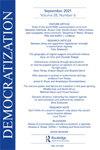Why do democratic societies tolerate undemocratic laws? Sorting public support for the national security act in South Korea
IF 2.9
1区 社会学
Q1 POLITICAL SCIENCE
引用次数: 0
Abstract
This study investigates why anti-democratic laws persist in democratic societies, focusing on South Korea's National Security Act (NSA). Enacted in 1948, the NSA restricts freedom of expression and movement to deter pro-North Korea behaviour. Despite being at odds with the tenets of running contrary to liberal democracy, the Act remains in place. Existing public opinion data indicates modest to strong support for the law, but measurement concerns leave much to be desired. Using a choice-based conjoint, we test the impact of democratic norms and national security rationales on various policy propositions related to the NSA, including its abolition. Results show widespread support for the Act, driven by both democratic norms and security concerns. Progressives are more likely to support revisions limiting the scope of the Act on the basis that it safeguards democracy, but they agree with conservatives that it should not be abolished. This research contributes to understanding South Korea's post-democratic transition and the balance between national security and democracy more broadly.为什么民主社会容忍不民主的法律?韩国公众对国家安全法的支持度排序
本研究调查了为什么反民主法律在民主社会中持续存在,重点是韩国的国家安全法(NSA)。美国国家安全局于1948年颁布,限制言论和行动自由,以遏制亲朝鲜行为。尽管与自由民主主义背道而驰,但该法案仍然存在。现有的民意数据显示,人们对这项法律的支持从温和到强烈不等,但衡量方面的担忧还有很多需要改进的地方。使用基于选择的联合,我们测试了民主规范和国家安全理由对与国家安全局相关的各种政策主张的影响,包括其废除。结果显示,出于民主规范和安全考虑,该法案得到了广泛支持。进步人士更有可能支持以保护民主为基础,限制该法案的范围,但他们同意保守派的观点,即不应废除该法案。这项研究有助于更广泛地理解韩国的后民主转型以及国家安全和民主之间的平衡。
本文章由计算机程序翻译,如有差异,请以英文原文为准。
求助全文
约1分钟内获得全文
求助全文
来源期刊

Democratization
POLITICAL SCIENCE-
CiteScore
6.40
自引率
12.50%
发文量
73
期刊介绍:
Democratization aims to promote a better understanding of democratization - defined as the way democratic norms, institutions and practices evolve and are disseminated both within and across national and cultural boundaries. While the focus is on democratization viewed as a process, the journal also builds on the enduring interest in democracy itself and its analysis. The emphasis is contemporary and the approach comparative, with the publication of scholarly contributions about those areas where democratization is currently attracting considerable attention world-wide.
 求助内容:
求助内容: 应助结果提醒方式:
应助结果提醒方式:


